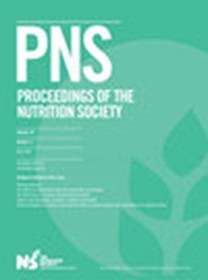摄入β-葡聚糖与限制能量和碳水化合物的膳食:对超重成年人主观食欲和胃肠道食欲激素的影响
IF 4.5
2区 医学
Q1 NUTRITION & DIETETICS
引用次数: 0
摘要
能量限制通常被用作减轻体重的干预措施(1)。然而,能量限制会改变胃肠道食欲激素的分泌,这可能会上调食欲,进而影响遵照医嘱进行干预的能力(1)。补充可溶性纤维可能会抵消这一影响(2)。这项研究旨在调查在限制能量和碳水化合物的膳食中添加β葡聚糖是否会影响超重成年人餐后胃肠道食欲激素的反应和主观食欲。23名久坐不动的超重或肥胖患者(年龄:36 ± 8.5 岁,体重指数:31.12 ± 4.04 kg/m2)参加了一项双盲随机交叉研究,该研究有两个实验组,每个实验组持续两天。第 1 天,参与者在家食用 Counterweight PRO800 代餐奶昔/汤,早餐和晚餐各提供约 200 千卡热量,午餐摄入的碳水化合物限制在其习惯能量摄入量的 35%。第 2 天,参与者在新陈代谢调查室用与第 1 天相同的早餐和午餐。在这两天中,每餐都会添加 3 克β-葡聚糖(Oat Well)或纤维素(Comprecel)作为安慰剂。第 2 天,记录空腹和餐后食欲评分,并采集空腹和餐后血样以测量血浆中酰化胃泌素、PYY 和 GLP-1 的浓度。该研究在 www.clinicaltrials.gov 注册为 NCT05981404。双向方差分析显示,餐后酰化胃泌素浓度(β-葡聚糖组,383 ± 23 pg/ml;安慰剂组,428 ± 23 pg/ml,P=0.02,治疗效果)和综合食欲评分(P=0.在β-葡聚糖治疗组,PYY浓度(β-葡聚糖治疗组,132 ± 5 pg/ml;安慰剂治疗组,110 ± 4 pg/ml,P= 0.003,治疗效果)明显低于安慰剂治疗组,PYY浓度(β-葡聚糖治疗组,132 ± 5 pg/ml;安慰剂治疗组,110 ± 4 pg/ml,P= 0.003,治疗效果)明显高于安慰剂治疗组。所获得的数据表明,在进食能量和碳水化合物限制的膳食时摄入β-葡聚糖,可望减轻饱腹感的减少和饥饿感的增加。因此,在进行能量限制干预以减轻体重时补充β-葡聚糖可能会提高依从性,减少能量负平衡带来的不适。本文章由计算机程序翻译,如有差异,请以英文原文为准。
Beta-glucan intake with energy and carbohydrate restricted meals: impact on subjective appetite and gastrointestinal appetite hormones in overweight adults
Energy restriction is commonly used as body weight-loss interventions (1) . However, it modifies secretion of gastrointestinal appetite hormones, which might be expected to upregulate appetite and thus impair the ability to comply with prescribed intervention(1) . Supplementation with soluble fibre may potentially counteract this matter (2) . This study aimed to investigate whether addition of β- glucan to energy and carbohydrate-restricted meals impacts postprandial responses of gastrointestinal appetite hormones and subjective appetite in overweight adults.Twenty-three sedentary individuals living with overweight or obesity (age: 36 ± 8.5 years, BMI: 31.12 ± 4.04 kg/m2 ) participated in a double-blind randomised crossover study with two experimental arms, each lasting over two days. On day 1, participants consumed Counterweight PRO800 meal replacement shakes/soups for breakfast and dinner at home, each providing ~200 kcal and a carbohydrate-restricted lunch providing 35% of their habitual energy intake. On day 2, participants attended the metabolic investigation room where they consumed the same breakfast and lunch as on day 1. On both days, each meal was taken with either 3g β-glucan (Oat Well) or cellulose (Comprecel) as placebo. On Day 2, fasting and postprandial appetite scores were recorded, and fasting and postprandial blood samples were obtained for the measurements of plasma concentration of acylated ghrelin, PYY, and GLP-1. The study is registered at www.clinicaltrials.gov as NCT05981404.Two-way ANOVA showed that the postprandial concentrations of acylated ghrelin (β-glucan arm, 383 ± 23 pg/ml; placebo arm, 428 ± 23 pg/ml, P=0.02, treatment effect) and composite appetite scores (P=0.003, treatment effect) were significantly lower and PYY concentrations (β-glucan arm, 132 ± 5 pg/ml; Placebo arm, 110 ± 4 pg/ml, P= 0.003, treatment effect) significantly higher in the β- glucan arm than in the Placebo arm. The concentrations of GLP-1 were not different between arms (β-glucan arm, 29 ± 1 pM; placebo arm, 28 ± 0.9 pM, P=0.36, treatment effect).The obtained data suggests that consuming β -glucan with energy and carbohydrate-restricted meals can be expected to attenuate reduction in satiety and diminish increase in hunger. Therefore, supplementation with β-glucan during energy restriction intervention applied to body weight loss might lead to improve compliance and reduce discomfort of negative energy balance.
求助全文
通过发布文献求助,成功后即可免费获取论文全文。
去求助
来源期刊
CiteScore
15.50
自引率
0.00%
发文量
190
审稿时长
6-12 weeks
期刊介绍:
Proceedings of the Nutrition Society publishes papers and abstracts presented by members and invited speakers at the scientific meetings of The Nutrition Society. The journal provides an invaluable record of the scientific research currently being undertaken, contributing to ''the scientific study of nutrition and its application to the maintenance of human and animal health.'' The journal is of interest to academics, researchers and clinical practice workers in both human and animal nutrition and related fields.

 求助内容:
求助内容: 应助结果提醒方式:
应助结果提醒方式:


